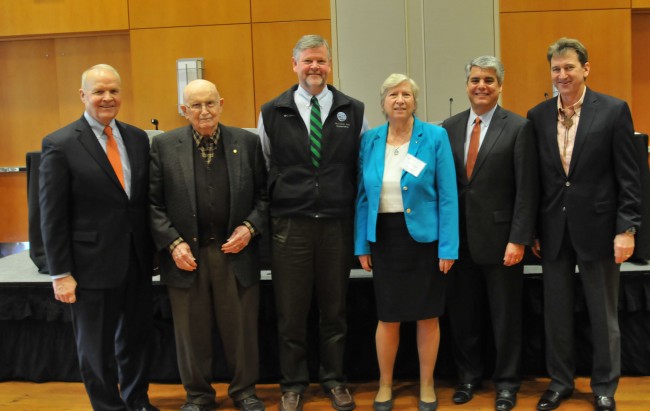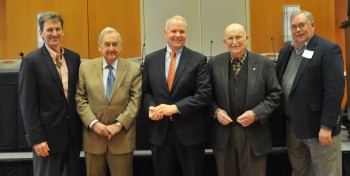Symposium Commemorates a Decade of Excellence, Looks Toward the Future
October 12, 2016

When Jack and Katie Jackson made the decision to invest their fortune in The University of Texas at Austin, they envisioned the creation of a worldclass school of geosciences to help solve problems important to Texas and the world.
Their vision guided a 10-year anniversary research symposium hosted by the Jackson School on Jan. 22, 2016, with research panels organized around the geosciences topics Jack specifically listed in the letter making his decision official: geology; geophysics; energy, mineral and water resources; and broad areas of Earth
sciences including the environment.
While the event commemorated a decade of accomplishments at the school, the discussions that filled the day focused on the future.
“As we celebrate our 10th anniversary, I think it’s only fitting that we look
toward the future,” said Dean Sharon Mosher at the welcoming event. “The future of the geosciences, the grand challenges that face society in the future, and of course, the role that the Jackson School could play in helping explore and solve these grand challenges.”
The daylong symposium was attended by the Jackson School community
and guests from around the country. Each panel, comprised of researchers,
professors and graduate students, was kicked off by a short lecture by a
distinguished speaker. The speaker for each panel was as follows:
• Energy, Mineral and Water Resources:
Steve Koonin, founding director of
NYU’s Center for Urban Science and
Progress and former Under Secretary
of Energy;
• Geophysics: Mark Zoback, director
of Stanford University’s Natural
Gas Initiative;
• Geology: George Davis, Geological
Society of America past president,
professor of structural geology
and provost emeritus at University
of Arizona, and alumnus of The
University of Texas at Austin; and
• Broad Areas of the Earth Sciences
Including the Environment: Marilu
Hastings, Vice President of Sustainability
Programs for the Cynthia and
George Mitchell Foundation.
Gregory Fenves, the president of The University of Texas at Austin, also addressed the guests. He stressed the importance of geology as a basic science, as well as a profession, and how the gift of Jack and Katie Jackson jumpstarted geosciences research by uniting three geological research units—The Department of Geological Sciences, the Institute for Geophysics, and the Bureau of Economic Geology—as the
Jackson School.
“My vision for the university is really built on interdisciplinary collaboration…and I think that was the founding idea in bringing together these three units together at the Jackson School,” Fenves said.

The Jackson Five
One of the highlights of the 10-year symposium was a special panel dedicated to remembering Jack Jackson and reflecting on his influence on the school today. The group, dubbed “The Jackson Five,” consisted of five people who were close to Jackson later in life and helped secure his estate for the university.
They were Larry Faulkner, former president of UT Austin; Peter Flawn, professor emeritus, former president of UT Austin; Bill Fisher, the Jackson School’s inaugural dean and the Leonidas T. Barrow Centennial Chair in Mineral Resources; James Langham, Jackson’s longtime financial advisor and executor of his estate; and Scott Tinker, director of the Jackson School’s Bureau of Economic Geology.
The group reminisced about Jackson and his many years on the Geology Foundation. Jackson, who made his fortune in the gas fields of Wise County and later in Dallas real estate, and wife Katie were longtime philanthropists who gave generously to education, health care and other issues they cared about. Katie died in 2001. The following year, Jackson made the decision to leave their estate to The University of Texas at Austin after his death.
“These words that we’re following today are partly Jack’s words and the vision he had for science, integration and what he wanted to invest in,” said Tinker, one of the symposium’s chief
organizers. “I think that’s an important piece. He’s not just someone who gave money, he actually had a vision for how
it would play out.”
